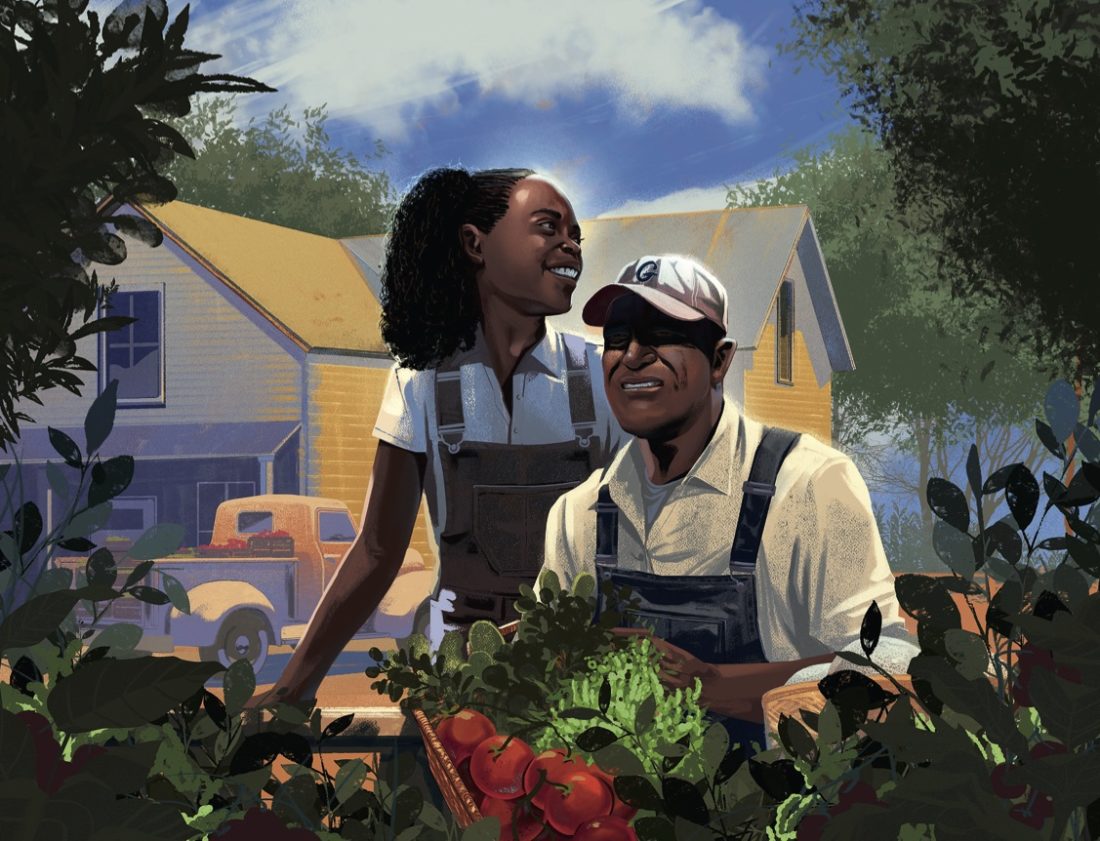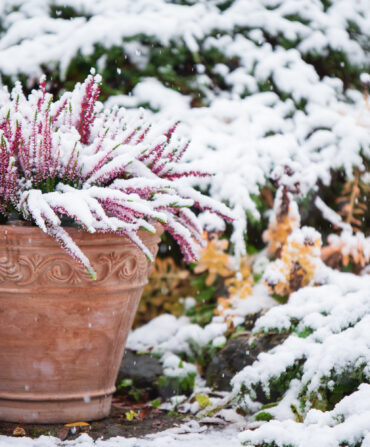My grandmother’s house is the center of my pine tree galaxy. As a child, I spent every holiday in that place, surrounded by family, sharing food, and telling stories. Mary Emma Graham, my father’s mother, was the keeper of our secrets and our memories, and her yellow two-story house tucked into a canopy of pines provided the setting for family gatherings, her walls and drawers overflowing with our photographs, awards, and scribbles. The acreage around it has been in my family’s possession for more than a hundred years. At a time when many other African Americans were still sharecroppers, we owned the place we called home, naming the streets after relatives, leaving our mark on the land.
Situated on the edge of Newberry County, South Carolina, the town of Silverstreet proper isn’t much to look at—one traffic light, one gas station, no grocery store. But the Saluda River flows not far from our backyard, the fishing is good, the land is fertile. To me, it’s perfect. And as I got older, I elected to spend much of my recreational time there. We grew everything from squash in the spring to cantaloupes and eggplants in the summer on the land, and my experiments on that farm taught me Mendel’s theories about plant properties and genetics in a way my biology teacher never could. I honed the interviewing skills I would later use as a journalist by grilling my third cousins Chris and Larry about their childhoods as they cleaned the crappies they caught on nearby Lake Greenwood.
By the time I was in graduate school, more funerals than social functions drew me to Silverstreet, and the old ways were dying out. I knew that where I was from was something worth saving, so I decided to start writing about this place, both fictionalized stories and oral histories of my elders, who told me about the days before electricity and refrigeration, who led me to the old family smokehouse to learn how we used to process hogs, who underscored that we practiced farm-to-table as a way of life, instead of an afterthought.
The land had its own gravitational pull. No matter where my travels took me, I always found my way back there.

In 2013, after a short, brutal bout with kidney cancer that metastasized to his lungs and brain, my father, Dennis Graham Jr., died. He left no will. My brother and I relinquished our rights to all money and property to our mother, but my half brother, who didn’t understand that cancer took the little cushion my family had, refused—he wanted us to buy out his portion. As the eldest daughter and my father’s primary caregiver, I saw it as my responsibility to sift through the mess. For the last six years, I’ve tried to save our stake in the Graham land, paying the property taxes and insurance on my daddy’s parcel. I burned through cash trying to make house repairs. The legal bills kept mounting.
In the end, the decision to let it go comes down to one thing: I’ve run out of money, and I need to settle the estate’s debts. So somebody gets our farm. Soon it will go on the auction block, to be sold to the highest bidder. I can’t control who gets our land, or if they will try to buy out my other land-rich but money-poor relatives, leaving us as a people without a homeplace. But when the estate lawyer’s emails marked ESTATE UPDATE and ESTATE: SALE CONTRACT FOR PROPERTY started piling up in my in-box, I figured it was time to say goodbye, to walk the land one last time.
The road home isn’t as beautiful anymore. When I was little and didn’t know enough about the world to be afraid of the dark, I used to sit under a now-missing pine tree and listen to the owls call out to one another. Now, lumber companies have taken the trees they believe to be worth something, leaving behind gaping holes and broken branches and ocher scars leading right up to the edge of our property.
The barn marking the family boundary still stands, missing more of its slats but defying gravity. The one-room shack where my daddy was born does, too, its green paint somehow impervious to the passing decades. I stroll past my cousins’ places, past Aunt Molly and Uncle Allen’s house, and Uncle Charles and May Jane’s home, to the far back field, where we grew cantaloupes. I can feel myself being watched, but nobody comes out to say anything. I don’t seek out anybody. I don’t know what I’d say. This rift has strained all my relationships. Selling land around here is a serious matter.
An uneasy quiet envelops me as I amble toward my grandmother’s house, making me acutely aware of my weight on the sand, the sound of my boots, the ragged clip of my breathing. Even though Grandma had a stroke almost two years ago that left her immobile and speechless, her little white car still sits out front as if waiting to take her for a drive, its front license plate reading PRAYER CHANGES THINGS in royal blue. Her sky-blue wheelbarrow, turned on its side and starting to rust, blends in with the fallen leaves nobody has gotten around to gathering. Everything is changing, and we are all having trouble adapting.

As I walk, I think about my daddy, how he used to stroll with me back when he was strong and capable, quick to laugh and eager to teach, curious about the state of the natural world and in awe of all its bounty. I had dreams for this land, too, ones I kept close to my chest. My job takes me far from home now, and without family support, farming full-time wasn’t for me anymore—still, I wanted others to love this place as I did. I wanted to turn our parcel into a retreat for writers and artists, who would trade time in the garden or kitchen for a place to lay their heads and work. I imagined we would sell our produce and preserved goods to offset costs, the long lines of glass jars filled with pickled okra and pear jelly shining like gems when the light hit just right. I would bring back my dad’s old produce stand, and I even held on to an old gold pickup truck that I planned to put out front with the sanctuary’s name on it. I wanted a big wooden barn where writers would give readings and neighbors would come check out books to read to their children.
I am signing away this part of myself, too.
The thing that bothers me more than the money, more than losing, though, is how I will explain to future generations, the ones who aren’t here yet, why this place mattered. How will the stories resonate about the hours I spent bent over my father’s stove canning chowchow, when I have nothing for them to harvest and process themselves? How do I convey the delight of coming home on spring break to find the yellow plum trees, planted in the front yard by my great-uncle Devoe, fully loaded? How do I explain the pleasure of the first bite of that ripe fruit, the way the pulp smears along the edges of your lips, leaving a lingering sweetness long after the plum is gone, when there is nothing left for them to taste?
I fret about the recipes and traditions so innate we never bothered to write them down. The way we soaked watermelon seeds in sugar water the night before planting them in order to make the fruit sweeter, the song about how to make honey locust wine, the quick scan we learned to do with our eyes when we hunted poke salad in the spring.
When I return from walking the land, I can’t breathe quite right, and I wonder for about a week if this is a heart attack or simply heartbreak. I wonder if untethering myself from Silverstreet will do me in, if by losing my land I am losing my anchor, my grasp on my sense of self. I question if this is what it is like to die of despair. My father didn’t wear heartbreak well either, dying 364 days after we closed the produce stand, unwilling to see the anniversary of the end of something he loved so much.
My daddy’s people have always made sense of the hard times through tales. When I was a child, and hail came and damaged our crops, Grandma taught us about Job. When school cliques turned against us, we got a lesson on Daniel and the lions’ den. There always seemed to be a parable, folktale, or Bible story for the moment. As an adult I don’t want to hear about divine intervention or miracles, knowing I can’t expect either. I have not found the story I am looking for, so I take refuge in writing my own. I want the world to understand: The Grahams of Silverstreet were here. We loved fiercely and fought hard and we carry this white river sand and Carolina red clay in our DNA. We will never be erased.
Latria Graham is a Garden & Gun contributing editor from Spartanburg, South Carolina, and writes the magazine’s This Land column, which documents aspects of the natural world in the South. An assistant professor of creative writing at Augusta University and an instructor for the University of Georgia's Narrative Nonfiction MFA program, Graham shares her adventures on Instagram (@mslatriagraham) and her work at LatriaGraham.com.








